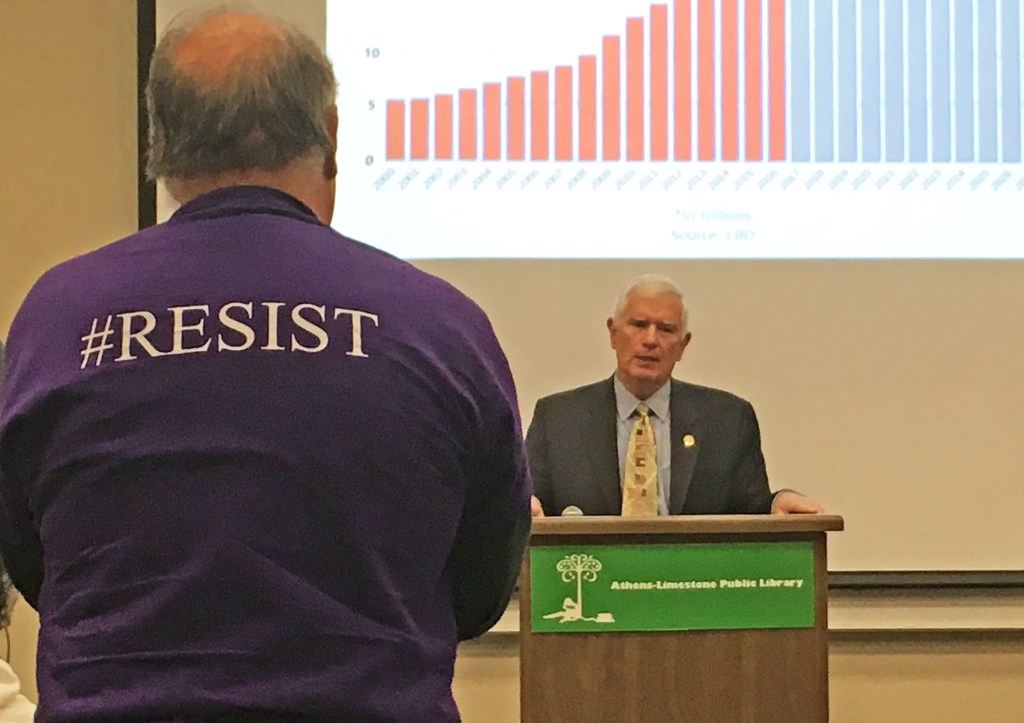Brooks defends support of Moore
Published 6:30 am Wednesday, November 29, 2017

- U.S. Rep. Mo Brooks, R-Alabama, takes a question from an audience member Monday at a town hall meeting at the Athens-Limestone Public Library, hosted by the Greater Limestone County Chamber of Commerce. A number of those in attendance were from Indivisible Alabama and wore purple #Resist shirts.
U.S. Rep. Mo Brooks, R-Alabama, said Monday he was no longer concerned about the U.S. Senate race because he had already cast his absentee ballot for fellow Republican Roy Moore.
The 5th District congressman said he would be out of town Dec. 12, hence the reason for the absentee ballot. Despite the allegations of sexual misconduct against Moore, Brooks said he voted for his fellow Republican because Moore’s views align with his own.
Trending
“I believe in border security and Doug Jones opposes that. I believe in trying to control deficit and debt. Doug Jones has every hallmark of being another socialist liberal Democrat,” Brooks said. “I don’t believe illegal aliens should come in and take jobs from American citizens. I have a belief system and I’m sure Doug Jones disagrees with that belief system that I think is important for America. I want a Supreme Court justice on the Supreme Court who will obey the Constitution, not make (law). Doug Jones is not that.”
Brooks’ admission of support for Moore occurred at a town hall meeting presented by the Greater Limestone County Chamber of Commerce and held at the Athens-Limestone Public Library. About 80 people attended, including several members of Indivisible Alabama who wore purple “Resist” shirts.
Prior to his presentation, Brooks said he was glad to see so many attendees wearing “University of North Alabama school colors, go Lions.” (UNA’s colors are purple and gold.)
Brooks’ opponents would hold up red cards when he said something they disagreed with and green cards when they were in agreement. There were far more red cards raised.
Defending Moore
The meeting was a mix of heated verbal confrontations between Brooks and audience members and thought-provoking questions about a tax bill being pushed by President Donald Trump, as well as other topics like the deficit and net neutrality. The heated discussions occurred when Brooks was asked about the charges of sexual misconduct against Moore.
Trending
Athens resident Kelly Range asked Brooks how he could support a pedophile. Brooks shot back that Range had no knowledge of that and that he was “making that up.”
“You have no idea what you’re talking about and no one in this room does because no one was there. Are you a witness?” Brooks asked.
A former prosecutor, Brooks said seven of the nine women who have accused Moore said “he treated them like a gentleman.” Brooks discounted the claims of Beverly Young Nelson because she and her attorney, Gloria Allred, refused to turn over a yearbook Nelson claimed was signed by Moore. (Allred has said she would turn over the yearbook if the U.S. Senate holds a hearing to address the accusations against Moore.)
Brooks accused Nelson of committing “fraud and forgery” in the yearbook, which “discounts her credibility.”
As for the allegations brought forth by Leigh Corfman, who claimed Moore sexually assaulted her when she was 14, Brooks said he didn’t know “who’s telling the truth.”
“But I do know Doug Jones will vote wrong,” Brooks said.
The discussion about Moore didn’t end there, however. A woman stood and told Brooks she had been sexually assaulted at ages 12 and 13. She asked Brooks to reconsider his support for Moore and “choose principles over politics.”
“How we as a society blame (the victims) and make them afraid to say anything matters more than any of your party affiliations,” she told the congressman.
Brooks again defended Moore and asked how many of those in attendance believed in due process. He brought up the Rolling Stone magazine story about a woman who falsely accused three Duke lacrosse players of raping her.
Brooks graduated from Duke University and said “there is no due process in being tried in the news media.”
He again described seven of the nine women who said they had dated Moore as teenagers as being in support of Moore and discounting Nelson’s claims.
“I’m not going to profess to know who’s telling the truth,” Brooks said of Corfman’s claims. “People lie for political reasons.”
Here’s a look at other topics covered at Monday’s town hall:
Federal retiree pensions
A federal employee asked Brooks why he voted “yes” on House Resolution 3354, which is the House budget resolution bill.
The employee said the bill eliminated the cost-of-living adjustment (COLA) for current and future Federal Employee Retirement System (FERS) participants. The man asked Brooks why he would vote against federal employees while voting to “give $1 trillion to corporations.”
Brooks said he voted for the bill because it funded other essential parts of government and that failure to pass an appropriations bill could result in a government shutdown and layoffs of federal employees. He described it as a “damned if you do, damned if you don’t situation.”
Net neutrality
An audience member asked Brooks his opinion on the Federal Communication Commission’s efforts to end net neutrality. The current rules treat internet service providers such as Comcast, AT&T and Verizon as if they were utility companies that provide essential services, like electricity. The rules mandate that they give equal access to all online content and apps.
Regulators, consumer advocates and some tech companies are concerned that repealing net neutrality will give ISPs even more power to block or slow down rival offerings. A repeal also opens the ability for ISPs to charge a company like Netflix for a faster path to its customers. Allowing this paid-priority market to exist could skew prices and create winners and losers among fledgling companies that require a high-speed connection to end-users.
The young lady asked Brooks if he would be willing to co-sponsor a bill to curtail the FCC’s overreach on the issue, but he advised her to first reach out to a congressman or senator who serves on a relevant committee.
“I believe in freedom and liberty and free enterprise,” Brooks said. “That means consumers ought to be able to choose whatever service they want for their internet. Similarly, providers of that information should be able to choose what best maximizes their profit, except when you have a monopolistic situation because free enterprise works best when there’s competition.”
The tax bill
Brooks was asked by Range why he voted for the House version of a tax bill that is part of President Donald Trump’s agenda. He described the bill in its current form as a vehicle for tax reform, which could be different by the time it emerges from a conference committee.
Range told Brooks he hopes it’s not the same “trickle-down” economics proposed by President Ronald Reagan in the 1980s. Brooks said he hopes it’s similar because Reagan’s bill led to “a quarter-century of uninterrupted economic growth.” He also cited a tax cut by President John F. Kennedy, which spurred economic growth.
“Those examples say there is some history there that says if you lower the cost of doing business in the United States of America, that makes businesses more competitive in a tough international marketplace (and) enables them to produce more goods, hire more people and get them off the welfare rolls, which would decrease the welfare costs of the central government and put (workers) in a position to be contributors to the revenue stream,” Brooks said.






